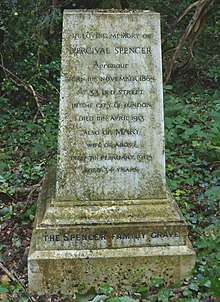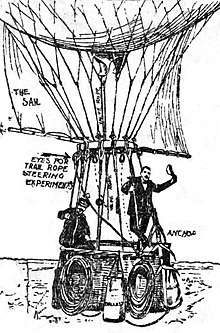Percival G. Spencer
Percival Green Spencer (11 November 1864, Islington, London, England – 11 April 1913, Highbury, London[1]) was a British pioneering balloonist and parachutist.
Percival Green Spencer | |
|---|---|
 Percival Spencer gravestone | |
| Born | 11 November 1864 Islington, London, England |
| Died | 11 April 1913 (aged 48) Highbury, London, England |
| Nationality | United Kingdom |
| Occupation | Manager of balloon manufacturer |
| Known for | Pioneer aviator |
| Spouse(s) | Mary Ann Coleman |
| Children | four daughters and one son |

Spencer was part of the third generation of a family of professional balloonists. He was the eldest son of Charles Green Spencer (1837–1880), who was the son of Edward Spencer (1799–1849).[1] Edward Spencer, a solicitor, was a friend and trusted assistant of the noted balloonist Charles Green,[2] ascending with Green 27 times and soloing 40 times.[1] Charles Spencer founded the balloon manufacturing firm of C. G. Spencer & Sons.[1] All five of Percival's siblings also followed the family profession.[1] He and his brothers Arthur (1866–1940) and Stanley (1868–1906) were considered the leading authorities on ballooning.[3]
Percival first ascended in a balloon at the age of eight with his father over the Crystal Palace.[3] In a November 1909 letter to the editor of Flight magazine, he claimed to have made eight "Cross-Sea Balloon Voyages", often with passengers.[4] His February 1898 crossing from England to France, accompanied by Pearson's Magazine journalist George Griffith, was reported in The New York Times.[5]
On 19 March 1889, he made the first successful balloon flight in India.[6] Ram Chandra Chatterjee took lessons from him and flew with him on 10 April,[7] becoming the first Indian aeronaut to fly solo later that same month.[8]
The same year, Spencer was the first to parachute safely in Ireland, at Drumcondra.[9]
Family life
Spencer married Mary Anne Coleman in 1892. They had four daughters and a son. His wife died in 1905. Spencer died at his home at Aberdeen Park, Highbury on 11 April 1913, after contracting bronchial pneumonia.[10]
References
- "Spencer, Percival Green". Who's Who of Ballooning. Retrieved 12 September 2012.
- Bacon, J. M. The Dominion of the Air: The Story of Aerial Navigation. Retrieved 13 September 2012.
- "Mr. Percival Spencer. The Most Famous Balloonist in the World". Papers Past, National Library of New Zealand. Retrieved 12 September 2012.
- Spencer, Percival. "To the editor of FLIGHT". Flight (27 November 1909): 770.
- "From England to France" (PDF). The New York Times. 28 February 1898.
- "Airmail". State Bank of Pakistan Museum. Retrieved 13 September 2012.
- Amitabha Ghosh (1992). Indian Journal of History of Science. Missing or empty
|title=(help) - Abhijit Gupta (2 August 2010). "First solo balloon flier". The Telegraph (Calcutta).
- "Irish GA spotlight". Flight International (28 March). 1981.
- "Mr. Percival Spencer". The Times. 12 April 1913. p. 11.